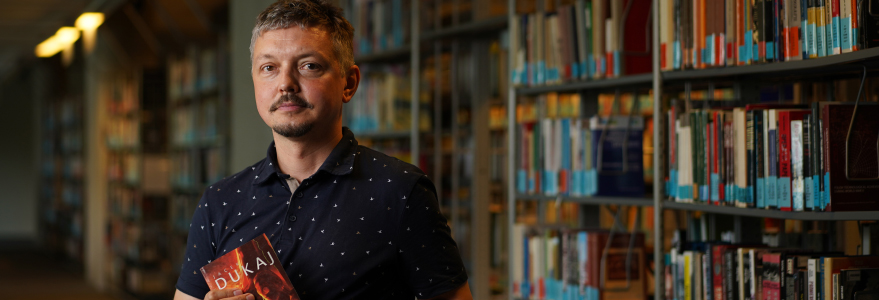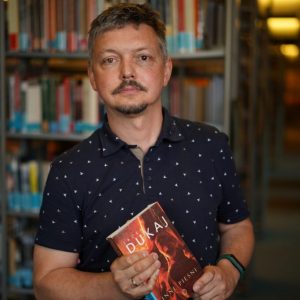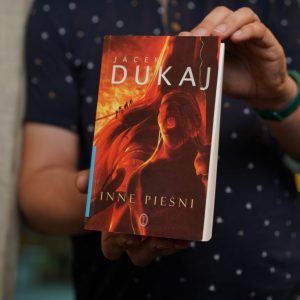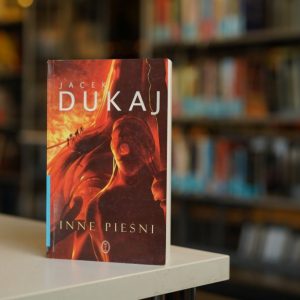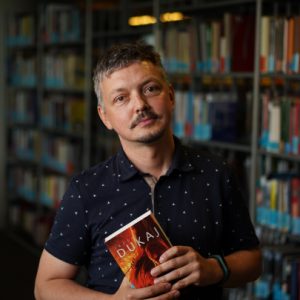“The great thing about fantasy literature is that each of us is equal to it, we know equally little, we start from the same level and we have the same chances of solving its puzzles,” Prof. Przemysław Kordos, the Vice-Dean for Student Affairs at the Faculty of „Artes Liberales”, says in the first episode of the third edition of the #ReadwithUW series.
Prof. Przemysław Kordos is a research and teaching assistant at the Faculty of „Artes Liberales” of the University of Warsaw. He graduated from the College of Inter-area Individual Studies in the Humanities and Social Sciences at the University of Warsaw. He also earned a degree in Postgraduate Hellenic Studies at the University of Warsaw. His doctoral thesis “Greece and the Greeks in the accounts of Polish travellers of the 20th century” was defended in 2007 at the Faculty of Polish Studies, University of Warsaw, and in 2019 he was awarded a doctoral degree for his dissertation „Beyond Greekness. Studies in contemporary Modern Greek prose”. Since 2016, he has held the position of the Vice-Dean for Student Affairs at the Faculty of „Artes Liberales” (head of the teaching unit).
His research interests include contemporary Greece and Cyprus, in particular national-cultural issues of identity, folklore, 20th and 21st century prose and fantasy in Polish literature and beyond.
An alternative history
“The book Other Songs (“Inne pieśni”) tells the story of a world made up of five elements, ruled by form. In this world, Alexander of Macedon died as an old man, and Greek philosophy persists – Aristotle and Empedocles were right,” Prof. Przemysław Kordos says.
The novel is set at the end of the 12th century PUR, i.e. after the fall of Rome. In this parallel reality, the Earth is the centre of the universe governed by five elements – ge (earth), hydor (water), aer (air), pyr (fire) and aether (ether). The continent is divided into states ruled by the Kratistosi.
In the book, characters with a stronger form dominate over those with a weaker form. The strongest form is possessed by the Kratistosi, and in their anthos (aura) people adopt their way of thinking and become physically similar to them.
Hieronim Berbelek, the main character of the novel, was himself one such “demigod”, a military leader, a strategos. He lost his form during a battle with the Wizard of Moscow in Kolenica. The novel depicts the adventurous wanderings of the main character, whose goal is to regain his lost form.
“Many people claim that this novel by Dukaj is the most sensational of all his books,” Prof. Przemysław Kordos explains, “The plot jumps from one place to another – and the areas in which the writer sets the action are very exotic, e.g. a safari in Africa or a journey to the moon.”
Questions without answers
Dukaj’s book is a perfect puzzle. The structure of the novel is designed in such a way that the reader is presented with the solutions to the riddles of reality surrounding the protagonists gradually, and sometimes has to come up with the solutions themselves.
“The book has many riddles that you have to solve yourself, such as the most obvious one: where does the title Other Songs come from? One answer is that the book is divided into twenty-four books, each named after one of the letters of the Greek alphabet, exactly as in the editions of Homer’s Iliad or Odyssey,” Prof. Przemysław Kordos explains.
Another riddle is the finale itself, and the answer to it is given by each reader independently.
Word games
“As befits a proper fantasy novel, the plot is only part of the whole puzzle. It is important that the world is introduced by means of numerous neologisms, which Dukaj does not always explain,” Prof. Kordos says, and adds, “This is particularly important to me, as these terms come from the Greek language.”
The author plays with words, which on the one hand enchants and delights the reader but, on the other, produces a surprising and bewildering effect, as not all the meanings of the newly created words can be understandable and decipherable. Jacek Dukaj describes the world using many neo-Greekisms created for the book, where a basic knowledge of Greek is useful for understanding the meaning of new words, e.g. esthlos, morfa, skoliodoi, keraunet, hyppyres (i.e. ryter pyru), keros and many others.
The novel created by Jacek Dukaj is full of unpredictable events and ambiguous characters and, above all, elements of an unknown world. The author, combining the ordinary with the extraordinary, describes a reality that is difficult to grasp with the mind or the idea from our world.
Other Songs by Jacek Dukaj, as well as other fantasy books can be found in the “Polish Literature & Language” section of Warsaw University Library.
Other Songs by Jacek Dukaj was published by Wydawnictwo Literackie in 2003. The second edition of the book was published in 2008 and the audiobook in 2011.
The novel received the Janusz A. Zajdel Award and the SFinks Award in 2003. It was nominated for the Book of the Year Award of the Poznański Przegląd Nowości Wydawniczych (PPNW, English: Poznań Review of New Works) and the Nautilius Award. It also gained Jacek Dukaj a nomination for the Polityka’s Passport Award in the field of literature.
Until the premiere of Ice (“Lód”), Other Songs was regarded by critics and readers as the best work in Jacek Dukaj’s oeuvre.



